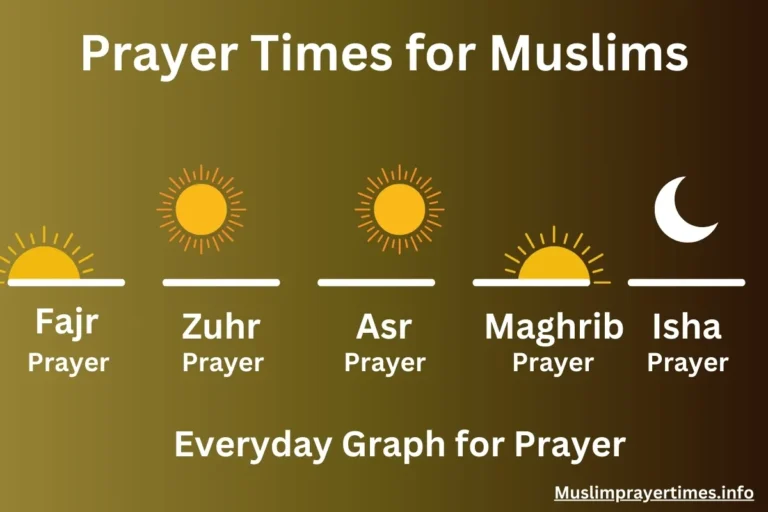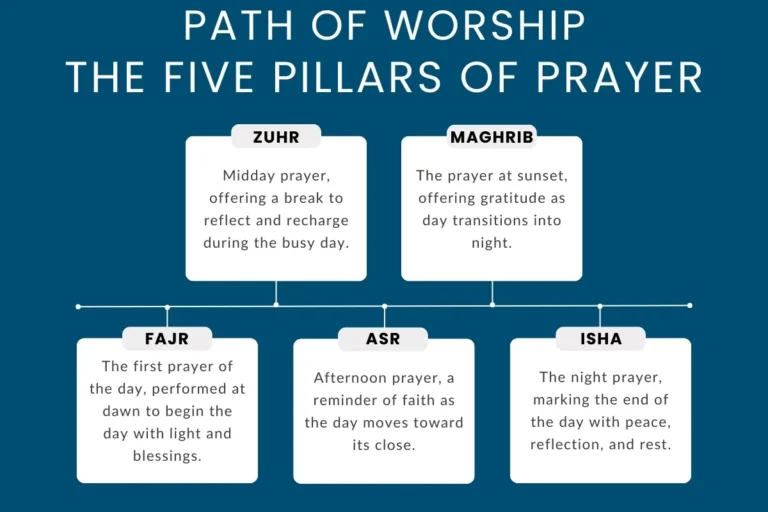بِسْمِ اللّٰهِ الرَّحْمٰنِ الرَّحِيْمِ
Day
Date
Islamic Date
Muslim Prayer Times
Muslims with hectic lifestyles often find it difficult to track prayer times. Maintaining the five daily prayers—each at its correct time—becomes challenging, especially while working, studying, or traveling. Even missing a single prayer can leave you feeling frustrated and disrupt your spiritual journey. Even minor setbacks can disrupt your efforts to stay spiritually grounded.
This is exactly where Muslim prayer times come to our aid as a solution. We offer our users an automatic and accurate prayer timetable for their current location so they won’t miss a single prayer while living there. Adhan notifications and mosque locators help you plan your day according to the prayer timetable, making it more convenient and offering spiritual tranquility to the soul.
Overview of Muslim Prayer Times
For Muslims, prayer times are a daily ritual; they need this time to rest and reconnect with the Creator. The five daily prayer times, observed at specific hours each day, help believers maintain spiritual grounding similar to that of monks. As part of daily prayers, there are 5 daily prayer times: Fajr (morning prayer), Dhuhr (noon prayer), Asr (afternoon prayer), Maghrib (evening prayer at sunset) and Isha (night prayer).
Correct prayer times are essential, as each prayer has a specific window for offering. With changing times throughout the year and across different locations having a trusted live prayer timetable saves the time wasted searching for accurate daily or monthly Salah schedules.
Without it, we risk missing prayers due to life’s unforeseen changes. Whether you are at home or traveling, syncing with Muslim prayer times is essential for maintaining both spiritual contentment and tranquility. Stay in Sync with the Islamic Year – Discover, Plan, and Celebrate with the Complete Hijri Calendar!

The 5 Daily Muslim Prayers and Their Timings
The 5 daily muslim prayers—Fajr, Dhuhr, Asr, Maghrib, and Isha—structure worship from morning to evening in accordance with the sun. We know that each prayer has a specific time; if we do not perform them on time, how can we maintain our religious commitment? These prayers are not just one-off rituals, they set a rhythm of mindfulness, gratitude, and building a closer relationship with him.
Since the structure of the day varies with location and season, accurate recordings help maintain this sacred routine. For those seeking accurate prayer times specifically in Saudi Arabia, check our detailed guide on Prayer Times in Makkah for reliable timings and monthly schedules
Fajr Prayer
The Fajr Prayer Times mark the start of every day for believers, awakening them with spiritual awareness for the day ahead. As part of the Islamic Prayer Times, Fajr’s timing often depends on seasons and locations—particularly near the poles—making precise scheduling essential. Praying Fajr at dawn awakens your consciousness and offers inner prosperity.
Dhuhr Prayer
Taking a moment for Dhuhr prayer gives you a chance to recharge spiritually in the middle of your day. It’s one of the five daily prayers, and it helps you pause whatever you’re doing to reflect and connect with Allah. Dhuhr, which is also called Zuhr, happens when the sun passes its highest point—so, it’s prayed in the early afternoon.
Muslim prayer times change depending on where you are and shift with the seasons, too. Sticking to Dhuhr prayer time helps believers stay consistent with their worship while managing their everyday tasks.
Asr Prayer
The Asr prayer time falls in the late afternoon, which means we can use it as a spiritual break before evening. It motivates believers to pay attention in the middle of daily tasks and, in doing so, promotes discipline and awareness of Allah. Since it’s a time filled with distractions, this makes the prayer even more meaningful.
Muslim prayer times vary depending on the region and can also change during special days of the year. So why not stay updated with the Asr prayer times for 2025 to improve your worship rhythm throughout the day?
Maghrib Prayer
Maghrib prayer time comes right after sunset, offering a perfect moment to pause and give thanks for another beautiful day. It’s a chance to slow down, reflect, and reconnect with Allah as the day slips into night. Since the Muslim prayer times shift with the seasons and vary by location, it’s important to keep track of it.
Isha Prayer
Isha, the fifth prayer of the day, is offered at nightfall. It offers a moment for reflection and marks a peaceful end to the day, helping people unwind and relax before sleep. As the final prayer of the day, Salat al-Isha encourages gratitude and prayers for forgiveness.
It must be observed at least until midnight. Since Islamic Isha prayer time varies with the sun’s position it’s important to follow updated schedules to pray on time. It brings a sense of calm and gratitude that carries you through the night.

Fajr
–:–
Dhuhr
–:–
Asr
–:–
Maghrib
–:–
Isha
–:–
Prayer Times Beyond the 5 Daily Prayers
In Islam besides the five daily prayers, there are special prayers that help build a stronger connection with Allah and bring peace to the soul. One of these is Tahajjud, a night prayer known for its quiet peaceful time when believers feel their prayers are especially heard. During Ramadan, Muslims pray Taraweeh at night, which encourages them to think deeply about the Qur’an as they recite it.
On Fridays, a special congregational prayer known as Jumuʿah is offered during which two units, or Rakʿāt, replace the four that are offered for Dhuhr. For the residents of the Philippines, you can also visit the complete guide on Prayer Times in Manila for all prayers including daily and monthly prayer time charts.
The first celebration of Eid is usually intialted by Eid prayers on the day of Eid al-Fitr. Istikhara is performed if someone was not sure which of the two has greater rewards, so a person can pray to Allah to guide him regarding something important in his life if he is in turmoil and does not know what decision to make.
And when someone passes away, the Janazah prayer is performed, offering blessings for the deceased and showing the community’s care and support. For those in Dubai, check the full Dubai prayer times to keep your schedule aligned with the city's timings.
Tahajjud Prayer
The Tahajjud prayer is offered during the last third of the night, providing an opportunity to seek forgiveness, make heartfelt supplications, and strengthen one’s spiritual connection. Muslim Prayer times Tahajjud is encouraged as a voluntary act of worship, and it is believed that prayers made during this time are especially accepted.
Praying during these final hours of the night, just before dawn, holds deep spiritual significance. Since the timing of Tahajjud prayer time changes with location and throughout the year, it’s important to stay mindful of prayer times to ensure it is performed correctly.
Jummah Prayer
Jummah prayer is the Friday congregational prayer that takes the place of the regular Dhuhr prayer. It also includes a Khutbah (sermon) that helps the community reflect on both spiritual matters and social issues. Since Pakistan is a diverse country, Jummah prayer times aren’t the same in every city.
Many people check local timings to make sure they get to the mosque on time for the congregation. This Muslim prayer times is meant to bring people together, build unity, and remind us why it’s important to stand as one. To learn more about the importance of specific duas in daily life, check out our guide to Duas for Protection to strengthen your faith
Compass to Mecca Perfect Qibla Alignment
Upcoming Islamic Events


Stay Updated with Prayer Times
Previously prayed times are often displayed, and to stay current with today’s and tomorrow’s Muslim prayer times, you can use a sound snippet of the Azan from a Salah app. Digital Azans are also common in mosques, but if you don’t attend regularly, online solutions are available. Many apps offer Azan alerts and automatically adjust prayer timings according to your location.
Simply enter “prayer times near me” to find the nearest congregation and stay updated, ensuring you never miss a prayer throughout the week. For accurate daily prayer times in Lahore, visit our Prayer Time in Lahore page. Stay up-to-date with the latest timings to keep your prayer routine on track.
Muslim Prayer Times Today
Keeping track of Muslim prayer times today helps ensure that prayers are offered right on time throughout the day. Each of the five prayers—Fajr, Dhuhr, Asr, Maghrib and Isha—has its own set time so being precise matters even more these days.
Since prayer times change depending on where you are and what time of year it is, apps or websites with updated schedules can really help. You can even set an alarm for the Azan to keep yourself on schedule, so no matter how busy things get, you won’t miss your prayers.
Planning for Tomorrow’s Prayer Times
Preparing in advance for prayer times tomorrow helps maintain regular worship, especially when life gets busy. It’s important to check local time changes using reliable prayer apps or websites to ensure accurate location-based and seasonally adjusted prayer times.
Many tools offer Muslim prayer times schedules for upcoming days, allowing believers to plan ahead and set alarms. This practice cultivates foresight and fosters spiritual discipline, ensuring that no prayer is missed, even amidst the busyness of daily life.
Mosque Prayer Times
Why do people check mosque prayer times to join gatherings? People search for terms like 'mosque prayer time near me' or use apps to find nearby mosques with authentic timetables. Such searches help ensure punctual attendance and also allow Muslims to discover additional mosque services, such as Quran classes, community events or religious counseling. This promotes both spiritual and social integration within the community.
Hijri Calendar Dates and Events
Hijri & Gregorian Calendar
The Largest Mosque in the World
This mosque is the real spiritual dedication associated with buildings that is an incredible accomplishment, rendering it among the finest on the planet. The mosque holds collective prayer and meditation for tens of thousands of worshippers as it is the biggest mosque on earth.
Celebrated as the world's most beautiful mosque, it is engraved with delicate Arabic inscriptions and stands tall with minarets overlooking vast courtyards. This cultural center is not only a place of worship for one billion people every year but also a symbol of unity and devotion. Its history reflects a unique blend of faith, learning and grandeur.

Different Prayer Times Among Islamic Traditions
Differences in Muslim prayer times across Islamic traditions are generally minor, with slight variations in when certain prayers start or end. For instance Shia practices allow time for Isha until complete nightfall while Sunni traditions have slight differences with Fajr and Maghrib. Other factors, like the angle of the sun or regional calculation methods, can also affect the exact timings.
These variations highlight the diversity within one faith, but all traditions ultimately aim toward the same goal—helping believers grow spiritually and build a stronger connection with Allah. Discover Accurate Prayer Times in Delhi with our Essential Monthly Guide, offering detailed daily and monthly schedules for all prayers in Delhi.
Sunni and Shia Prayer Practices
While some prayer times are subtly different between Sunni and Shia Muslims, they both observe the same core prayers. Sunni prayer times follow the five fixed daily prayers, while Shia prayer times usually merge Dhuhr with Asr and Maghrib with Isha. Additionally Shia practices may delay Isha until complete nightfall. However both traditions emphasize daily worship and are deeply rooted in the pursuit of Allah.
Prayer Timings by Islamic Schools of Thought
Muslim prayer times differ slightly among Islamic schools of thought like Hanafi, Shafi, Maliki and Hanbali. For example Hanafi scholars tend to delay Asr a bit later, placing it after all the other prayers. On the other hand Shafi prayer times and Maliki prayer times are almost identical, with Asr starting just a minute earlier.
The Hanbali prayer times are pretty close too, especially with Isha, though they might differ a little when it comes to Fajr. These differences reflect the diversity within Islamic traditions helping maintain discipline and devotion while giving space for reflection and spiritual growth.
Daily Hidayat & Quran Reflections

Inspirational Quotes & Hadiths
جاري تحميل الاقتباسات...
Loading quotes...
Daily Hadith
جاري تحميل الحديث...
Fetching Hadith of the Day...
Maintaining Consistency with Prayer Times
Muslim prayer times help build spiritual discipline and strengthen our relationship with Allah. Resources like Calendar and Azan features can help manage variations in daily life caused by changing routines or shifting seasons.
Prayer, once you learn how, can bring intention, awareness and peace into your day and expand your spirit. Stay connected with your daily prayers and below is the complete prayer times for Nairobi through our Monthly Prayer Times in Nairobi – Islamic Prayer Schedule.
Why Muslims Pray 5 Times a Day?
For Muslims, praying five times a day holds great importance. It’s not just a ritual performed out of obligation, but a divine command in the Quran to maintain daily discipline. Fajr, Dhuhr, Asr, Maghrib, and Isha are spiritual anchors, tethering the different parts of the day to Allah.
Praying regularly cleanses the soul, cultivates positivity, and gives us a moment of peace amidst life’s chaos. The Quran requires Muslims to pray five times a day to keep faith at the center of their daily lives, ensuring that worldly distractions don’t interfere with their spiritual journey.
Rakats and Timings for Each Prayer
The stipulated number of units, or rakats, and the times for each of the five daily prayers are clearly defined. Knowing the prayer rakats and times helps believers perform their prayers easily and on time. Fajr has 2 fard rakats, Dhuhr and Asr each have 4, Maghrib has 3, and Isha consists of 4 fard rakats.
Additionally Isha is often followed by the Witr prayer, which many perform as a way to close the day’s worship. Praying at specific times — dawn for Fajr, midday and afternoon for Dhuhr and Asr, sunset for Maghrib, and night for Isha — aligns worship with our natural rhythm. Every prayer provides a chance to center ourselves with structured devotion and mindfulness.
Weather Updates For Your City
Local Weather
Loading...
Fetching location...
--°C
Islamic Prayer Times By Location
Islamic prayer times are different everywhere because each place follows the movement of the sun. It mostly depends on the location’s latitude and longitude along with the time zone.
Many mosques and community groups offer real-time schedules through their websites, GPS apps, or local announcements. Whether you’re at home on the move, or in a group, these tools help Muslims stay on track with their prayers, no matter where they are.
Finding Prayer Times in Your Location
Keeping track of Muslim prayer times in my location is really important to make sure I pray on time. Mosque websites and online platforms quickly show prayer times by figuring out the area’s location, so the time zone adjusts automatically. These tools also send notifications and reminders based on where you are, helping you stay on track with your prayers, whether you’re at home or traveling.
Having location-based access allows you to keep your prayer schedule on path and integrate nicely into your daily life. If you ever finding yourself in Algiers and wondering when the next prayer is? You would also have our authentic timetable based on prayer times that will never let you mess up with Fajr, Dhuhr, Asr, Maghrib and Isha.
Online Resources for Accurate Prayer Timings
The internet provides real-time Salat prayer times based on accurate local area information, including your specific location. Our Websites offer Muslim prayer times with respect to time zones, geographic coordinates, and seasonal changes, making them useful for apps and mosque portals.
Many of these apps also offer azan alerts, prayer trackers, and reminders to help Muslims with their five daily prayers. These digital tools make it easy for believers to plan their prayers anywhere—whether at home, on the go, or in the community.
Regional Services and Variants
Islamic worship is quite diverse—just look at prayer schedules, which reflect the customs of different locales and specific practices. For example, Muslims living around Woking rely on correct namaz times to stay in sync with their mosque’s schedule. In the Shia tradition, particularly in the Jafari prayer times, Dhuhr and Asr, as well as Maghrib and Isha, can be prayed together.
Ismaili prayer times align with specific teachings from their spiritual tradition. Although varied, these slight differences all serve the same purpose to help worshippers, no matter where they are or which tradition they follow, maintain timely worship and a strong connection with Allah.
Prayer for strength during difficult times
For many Muslims, Islam brings comfort and strength, especially during tough times. Prayer acts like a spiritual anchor, helping them stay patient, hopeful, and at peace even when life gets hard.
The five daily prayers give believers a chance to talk with Allah, reflect on their lives, and ask Him for strength. Whether it’s through personal dua or extra follow-up prayers, these acts of worship remind believers that, with faith and patience, they can get through any hardship.
Final Words
Praying on time throughout the day is key to remembering Allah, whether by reflecting on the recitations or making sujud and thanking Him for the food he has eaten. These all Muslim prayer times—Fajr, Dhuhr, Asr, Maghrib, and Isha—work with the natural world as reminders to maintain balance by making time for prayer, even amid daily obligations.
Find out the most reliable prayer times for Cape Town with our updated guide, offering precise schedules for all five daily prayers. When you stick to Islamic prayer times—whether through apps, mosque schedules, or online platforms—it makes it easier to stay regular with your worship and find a sense of peace within yourself.
Whether you’re traveling the world, covering war zones, or reporting live from weddings and crime scenes, making time for prayer has only gotten easier. It helps you meet your religious duties while also building patience and keeping a strong connection with your faith, no matter where life takes you. For Muslims in Cairo, our monthly prayer times guide is essential. Find out the accurate timings by reading our full post on Prayer Times in Cairo.
Prayer Time Notifications

